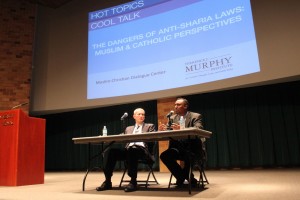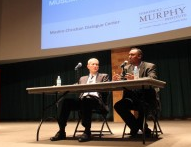“The Dangers of Anti-Sharia Laws: Muslim and Catholic Perspectives,” the second event of the “Hot Topics: Cool Talk” forum, was held in the O’Shaughnessy Educational Center auditorium Tuesday.
Robert Vischer, St. Thomas professor and associate dean for academic affairs in the School of Law, and Abdulwahid Qalinle, adjunct associate professor of law at the University of Minnesota Law School and director of its Islamic and Human Rights Program, presented arguments for why anti-Sharia initiatives should be vigorously contested by defenders of religious freedoms.

Sharia is Islamic law that constitutes everyday activities from preparing a meal to marriage rituals for Muslims.
Vischer said he wasn’t an expert on Sharia Law, but would speak as a Catholic and a lawyer who is committed to religious liberty in a meaningful way.
He said Islam in the U.S. is a minority, and debates on religious liberty shouldn’t be about which minority groups, like Muslims, get to maintain their chosen ways of life.
“Rather religious liberty is an anthropological claim about the nature of the human person,” Vischer said. “As such, it should not be left vulnerable to popularity contests.”
Vischer encouraged Christians to resist keeping religious beliefs out of the public square and to refrain from making religious liberty into a popularity contest. A popularity contest Muslims can’t win, he said.
“Many are unwittingly supporting this trend by attacking the liberty of the religious believers who are least well-positioned to win any popularity contest in America today,” Vischer said.
Freshman Ben Dymit attended the forum not only because he was offered extra credit, but also because he found the topic relevant to the upcoming elections.
“I was very satisfied with the discussions, but I wish they had given more background information before giving their perspectives,” Dymit said.
Dymit said he was unfamiliar with the anti-Sharia and spent the first few minutes of the forum researching the term on Google.
“Proposals and state legislators across the country aim to keep Muslim beliefs out of the legal system by prohibiting courts from relying on Sharia,” he said.
Vischer said these anti-Sharia initiatives are the most politically popular example of the expectation that religious state is a private matter.
Qalinle explained that Sharia refers to the code and the religion of Islam found in the Book of Islam and the traditions of the prophet Muhammad. He said that because Sharia refers to Islam itself, it is dangerous to discard and delegate the comprehensive term.
“The misconception comes from many people who try to concentrate on aspects of Islam punishment,” Qalinle said. “(Sharia) contains punishments or parts of laws that are subject to interpretation of mankind and human being.”
Qalinle explained that there are cases where the United States government and courts considered, respected and understood foreign law.
“The Sharia as a foreign law, just like any other law, is as much a threat to the constitution and laws of the United States as the Bible is,” Qalinle said. “There is no attempt to impose Sharia, nor has there been any verifiable effort by any group or individuals to substitute Sharia with United States laws and constitution.”
Senior Nick Hermann attended the event with his 400-level Islam theology class.
“I think it was nice to see a dialogue between Christianity and Islam done in a really professional fashion than what we get from the general media,” Hermann said.
Dymit said he plans to attend similar events in the future because they provided a reflection on his own faith.
“I would encourage others to attend because the theology department works very hard to have accomplished faculty to come in for these talks, and they are very effective in broadening a person’s global perspective,” Dymit said.
Bjorn Saterbak can be reached at sate3878@stthomas.edu.

